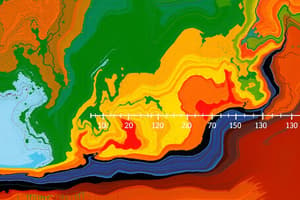Podcast
Questions and Answers
Match the following geologic time units with their description:
Match the following geologic time units with their description:
Eons = Largest unit of time in the geologic time scale Eras = Smaller unit of time than eons Periods = Smaller unit of time than eras Epochs = Smallest unit of time in the geologic time scale
Match the following geologic time units with the number of divisions:
Match the following geologic time units with the number of divisions:
Eons = Four Eras = Several Periods = Several Epochs = Several
Match the following geologic time units with the characteristic that defines them:
Match the following geologic time units with the characteristic that defines them:
Eras = Significant geological or biological events Periods = Distinct rock formations and fossil records Epochs = Specific geological or biological events Eons = Major stages in the Earth's development
Match the following examples with the correct geologic time unit:
Match the following examples with the correct geologic time unit:
Match the following characteristics with the correct geologic time unit:
Match the following characteristics with the correct geologic time unit:
Match the following concepts with the correct description:
Match the following concepts with the correct description:
Flashcards are hidden until you start studying
Study Notes
Geologic Time Scale
Eons
- Largest unit of time in the geologic time scale
- Divided into four eons: Hadean, Archean, Proterozoic, and Phanerozoic
- Each eon represents a major stage in the Earth's development
- Eons are further divided into eras
Eras
- Smaller unit of time than eons
- Divided into several eras, each representing a distinct phase in the Earth's history
- Eras are characterized by significant geological or biological events
- Examples of eras include the Paleozoic, Mesozoic, and Cenozoic eras
Periods
- Smaller unit of time than eras
- Divided into several periods, each representing a specific interval of time
- Periods are characterized by distinct rock formations and fossil records
- Examples of periods include the Triassic, Jurassic, and Cretaceous periods
Epochs
- Smallest unit of time in the geologic time scale
- Divided into several epochs, each representing a short interval of time
- Epochs are often characterized by specific geological or biological events
- Examples of epochs include the Pleistocene and Holocene epochs
Fossil Record
- The fossil record provides a chronological record of the history of life on Earth
- Fossils are remains or impressions of ancient organisms preserved in rock
- The fossil record is used to date rocks and reconstruct the Earth's history
- Fossils are often used to correlate rock formations and determine the relative age of rocks
- The fossil record provides evidence for evolution and plate tectonics
Geologic Time Scale
Eons
- The largest unit of time, representing a major stage in the Earth's development
- Divided into four eons: Hadean ( Earliest phase of Earth's formation), Archean (oldest life forms), Proterozoic (oxygenation of atmosphere), and Phanerozoic (complex life forms)
Eras
- Characterized by significant geological or biological events, such as the formation of oceans or the development of life
- Examples include the Paleozoic (ancient life forms), Mesozoic (age of reptiles), and Cenozoic (age of mammals) eras
Periods
- Characterized by distinct rock formations and fossil records, such as the Triassic (early dinosaurs), Jurassic (dinosaurs dominate), and Cretaceous (flowering plants and modern mammals) periods
Epochs
- Short intervals of time, often characterized by specific geological or biological events, such as the Pleistocene (ice ages) and Holocene (current epoch) epochs
Fossil Record
- Provides a chronological record of the history of life on Earth through fossil remains or impressions of ancient organisms
- Used to date rocks and reconstruct the Earth's history
- Fossils are used to correlate rock formations and determine the relative age of rocks
- Provides evidence for evolution and plate tectonics
Studying That Suits You
Use AI to generate personalized quizzes and flashcards to suit your learning preferences.




